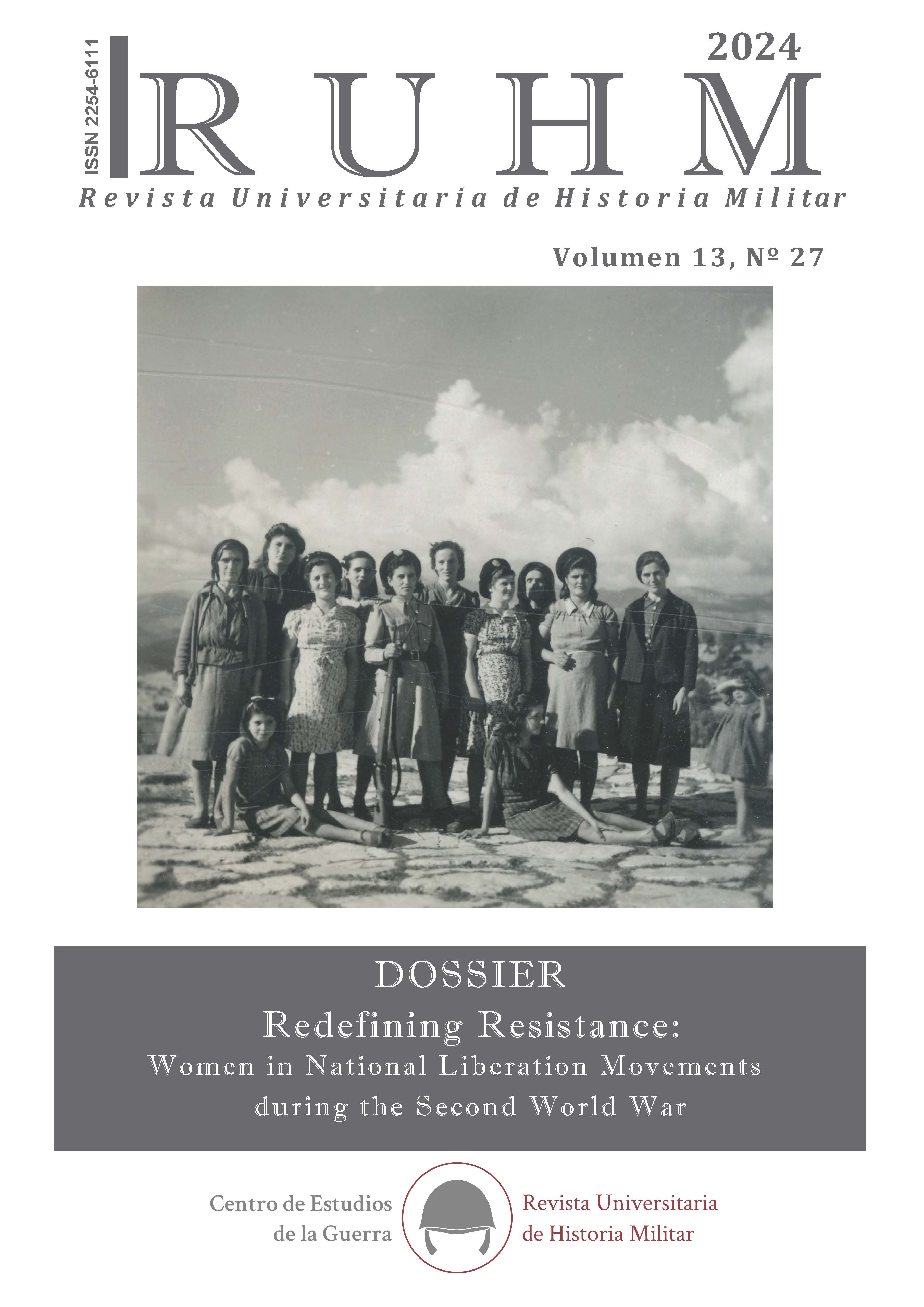Redefiniendo la Resistencia: mujeres en los movimientos de liberación nacional durante la Segunda Guerra Mundial
DOI:
https://doi.org/10.53351/m8k6r055Palabras clave:
Estudios de género, Mujeres, Resistencia Armada, Resistencia Civil, Segunda Guerra MundialResumen
Este número especial analiza los roles diversos de las mujeres en los movimientos de resistencia durante la Segunda Guerra Mundial, con casos de España, Grecia, Italia y Polonia. Cuestiona las definiciones militarizadas y masculinas de la resistencia, destacando las aportaciones clave de las mujeres en esfuerzos armados y no armados. Los artículos muestran cómo superaron normas sociales arraigadas para involucrarse en actividades como logística guerrillera, combate, sabotaje y organización clandestina, transformando sus roles en tiempos de guerra. Este enfoque revela cómo sus acciones no solo contribuyeron a la liberación nacional, sino también a cambios sociales y culturales significativos.
Descargas
Referencias
Jelena BATINIĆ: Women and Yugoslav Partisans: A History of World War II Resistance, Cambridge,Cambridge University Press, 2015.
Jean BETHKE ELSHTAIN: Women and War, New York, Basic, 1987.
Angus CALDER: The People’s War: Britain 1939-1945, New York, Pantheon, 1969.
Margaret COLLINS WEITZ: Sisters in the Resistance: How Women Fought to Free France, 1940-1945, New York, John Wiley & Sons Inc, 1995.
Kazimiera J. COTTAM: Soviet Airwomen in Combat in World War II, Manhattan, Kansas, MA/AH Publishing, 1983.
Gerard J. DEGROOT and C. PENISTON-BIRD: A Soldier and a Woman: Sexual Integration in the Military, London, Routledge, 2000.
Maurine GREENWALD: Women, War, and Work: The Impact of World War I on Women Workers in the United States, Westport, Conn., Greenwood Press, 1980.
Ada GOBETTI: Partisan Diary: A Woman’s Life in the Italian Resistance, Oxford, Oxford University Press, 2014
Nancy GOLDMAN: Female Soldiers - Combatants or Non-Combatants: Historical and Contemporary Perspectives, London, Greenwood Press, 1982.
Cynthia ENLOE: Maneuvers: The International Politics of Militarizing Women’s Lives, Berkeley, University of California Press, 2000.
Jane HART: New Voices in the Nation: Women in Greek Resistance, 1941-1964, Ithaca, Cornell University Press, 1996.
Melissa HERBERT: Camouflage Isn’t Only for Combat: Gender, Sexuality and Women in the Military, New York, NYU Press, 1998.
Margaret HIGONNET and Patrice HIGONETTE: “The Double Helix”, in Margaret HIGONETTE et al. (eds.): Behind the Line: Gender and the Two World Wars, New Haven, Yale University Press, 1987, pp. 31-50.
Anna KRYSLOVA: Soviet Women in Combat: A History of Violence on the Eastern Front, Cambridge, Cambridge University Press, 2010.
Margaret LAFOY ROSSITER: Women in the Resistance, Westport CT, Praeger Publishers Inc, 1985.
Rachel MARGOLIS: A Partisan from Vilna, Boston, Academic Studies, 2010.
Roger D. MARKWICK and Euridice Charon CARDONA: Soviet Women on the Frontline in the Second World War, New York, Palgrave Macmillan, 2012.
Juliette PATTINSON: Behind Enemy Lines: Gender, Passing and the Special Operations Executive in the Second World War, Manchester, Manchester University Press, 2007.
Alexis PERI: “Womanhood Under Fire: Gender Practice and Identity in Soviet Accounts of the Front Lines”, in Mark CROWLEY and Sandra TRUDGEN DAWSON (eds.): Women’s Experiences of War: Exile, Occupation and Everyday Life, 1939-45, London, The Boydell Pres, 2020.
Joan SCOTT: “Women and War: A Focus for Rewriting History”, Women’s Studies Quarterly, 12:2, Teaching about Peace, War, and Women in the Military (1984), pp. 2-6.
Joan SCOTT: “Gender: A Useful Category of Historical Analysis”, The American Historical Review, 91:5 (1986), pp. 1053-1075.
Jane SLAUGHTER: Women and the Italian Resistance, Portland, Arden Press, 1997.
Nathan STOLTZFUS, Mordecai PALDIEL, and Judy BAUMELl-SCHWART: “Women Defying Hitler. An Introduction”, in Nathan STOLTZFUS, Mordecai PALDIEL, and Judy BAUMELl-SCHWART: (eds.): Women Defying Hitler. Rescue and Resistance under the Nazis, London, Bloomsbury Publishing, 2021.
Ingrid STROBL: Partisanas. Women in the Armed Resistance to Fascism and German Occupation (1936-1945), Edinburgh, Oakland, West Virginia, AK Press, 2008 (first edition in 1987).
Francoise THEBAUD: La femme au temps de la guerre de 14, Paris, Stock, 1986.
Tasoula VERVENIOTI: I gynaika tis Antistasis. I eisodos ton gynaikon stin Politiki [The Woman of the Resistance: Women’s Entrance into Politics], Atenas, Odysseas, 1994.
June A. WILLENZ: Women Veterans: America’s Forgotten Heroines, New York, Continuum, 1983.
Descargas
Publicado
Número
Sección
Licencia
Derechos de autor 2024 Magda Fytili

Esta obra está bajo una licencia internacional Creative Commons Atribución-NoComercial-SinDerivadas 4.0.
Licencia Creative Commons Atribución-NoComercial-SinDerivar 4.0 Internacional
Esto es un resumen legible (y no un sustitutivo) de la licencia.
Usted es libre para:
Bajo los siguientes términos:
-
Atribución — Usted debe darle crédito a esta obra de manera adecuada, proporcionando un enlace a la licencia, e indicando si se han realizado cambios. Puede hacerlo en cualquier forma razonable, pero no de forma tal que sugiera que usted o su uso tienen el apoyo del licenciante.
-
NoComercial — Usted no puede hacer uso del material con fines comerciales.
-
Sin Derivar — Si usted mezcla, transforma o crea nuevo material a partir de esta obra, usted no podrá distribuir el material modificado.
No hay restricciones adicionales — Usted no puede aplicar términos legales ni medidas tecnológicas que restrinjan legalmente a otros hacer cualquier uso permitido por la licencia.








